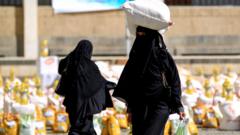The suspension of US aid in Sudan has led to the closure of approximately 80% of emergency food kitchens, which were crucial for those affected by the ongoing civil war. Volunteers report that over a million people are now facing the prospect of starvation, as the violence between the army and paramilitary forces continues to devastate the country. This drastic measure stems from an executive order by the Trump administration, aimed at reviewing US aid policies to ensure alignment with national interests.
Aid Cuts in Sudan: A Crisis Deepens as Community Kitchens Close

Aid Cuts in Sudan: A Crisis Deepens as Community Kitchens Close
The freezing of US humanitarian assistance threatens millions in Sudan, with major food programs shutting down amid ongoing conflict.
The humanitarian situation in Sudan has worsened dramatically since the onset of the civil war in April 2023, leading to tens of thousands of deaths and the displacement of millions. The communal kitchens, managed by grassroots organizations, were established in response to the famine conditions affecting over two million civilians. With funding largely dependent on the US Agency for International Development (USAID), the recent suspension has left many grassroots responses unprepared for the impending crisis.
This aid cut adds to the existing humanitarian challenges, as the system designed to facilitate emergency assistance has become increasingly complex. While the State Department has issued exemptions for emergency food assistance, there remains significant ambiguity surrounding the types of aid that will be restored, especially concerning cash assistance for communal kitchens.
The impact of the US aid freeze reverberates beyond Sudan’s borders, as neighboring countries now host millions of refugees fleeing conflict and hunger. With limited resources, organizations like the UNHCR are struggling to meet the needs of the growing refugee population amid chronic underfunding. Many displaced individuals recount harrowing journeys to escape the violence, yet arrive in situations rife with their own set of challenges including malnutrition and harassment.
With food security collapsing, the future of humanitarian aid in Sudan remains uncertain. Community organizers are attempting to bridge the funding gap through private donations but acknowledge the reality of an escalating hunger crisis and are bracing for even harsher conditions ahead. Faced with such dire circumstances, the urgency for a resolution to the conflict and restoration of aid continues to be paramount for the survival of millions.
As the situation in Sudan continues to deteriorate, the need for an effective global response becomes increasingly critical. The complexities surrounding foreign humanitarian aid, particularly from the United States, underscore the essential challenge of aiding those in desperate need while navigating political considerations.
The crisis in Sudan exemplifies a broader narrative of humanitarian need across the globe, as local backgrounds and international policies converge to shape the lives of millions.
This aid cut adds to the existing humanitarian challenges, as the system designed to facilitate emergency assistance has become increasingly complex. While the State Department has issued exemptions for emergency food assistance, there remains significant ambiguity surrounding the types of aid that will be restored, especially concerning cash assistance for communal kitchens.
The impact of the US aid freeze reverberates beyond Sudan’s borders, as neighboring countries now host millions of refugees fleeing conflict and hunger. With limited resources, organizations like the UNHCR are struggling to meet the needs of the growing refugee population amid chronic underfunding. Many displaced individuals recount harrowing journeys to escape the violence, yet arrive in situations rife with their own set of challenges including malnutrition and harassment.
With food security collapsing, the future of humanitarian aid in Sudan remains uncertain. Community organizers are attempting to bridge the funding gap through private donations but acknowledge the reality of an escalating hunger crisis and are bracing for even harsher conditions ahead. Faced with such dire circumstances, the urgency for a resolution to the conflict and restoration of aid continues to be paramount for the survival of millions.
As the situation in Sudan continues to deteriorate, the need for an effective global response becomes increasingly critical. The complexities surrounding foreign humanitarian aid, particularly from the United States, underscore the essential challenge of aiding those in desperate need while navigating political considerations.
The crisis in Sudan exemplifies a broader narrative of humanitarian need across the globe, as local backgrounds and international policies converge to shape the lives of millions.




















